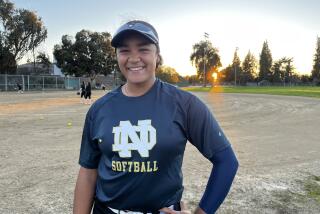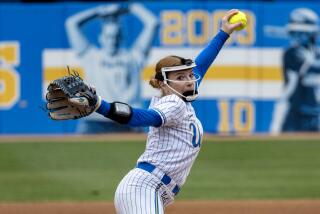An Olympian Effort : Jordan Sticks With Softball Through Pleasure and Pain
- Share via
HUNTINGTON BEACH — There are times, usually when the air is dry and frigid, when Barbara Jordan feels much older than her 29 years.
Her right knee stiffens and a dull pain emanates from deep beneath her teeth, numbing the right side of her jaw.
During these moments, Jordan considers the enormity of her sacrifice and wonders if the effort is worth . . .
Time out.
Take that back.
Truth be told, Jordan never, ever ponders her fate or questions her devotion. Others might second-guess, but she does not afford herself the opportunity.
She is too busy chasing the carrot.
Jordan wants to play on America’s first Olympic softball team. Heaven help anyone who stands in her way. Other players have made the 1996 Games in Atlanta a goal.
For Jordan, it is an obsession.
“I would rather die than not make the Olympic team,” she says earnestly. “It means everything to me.”
Failing to make the squad is an option Jordan has never paused to consider.
“I don’t allow myself to think that way,” the former Cal State Northridge All-American said. “I can’t even picture it.”
Perhaps because her confidence is so high.
Saturday, Jordan will play center field for the East team in first-round action of the Olympic Festival in St. Louis. At the end of the competition, a team of 16 players will be selected to represent the United States at the World Games in Newfoundland later this summer.
Jordan already has made arrangements to take two months off from her job as a private investigator.
“You say softball and my stomach just goes, “ Jordan said. “It’s all I talk about. It’s my life.”
None of this should come as a surprise to those who remember Jordan as the fiery catalyst of Northridge’s NCAA Division II championship teams in 1984, ’85 and ’87.
Even then, she played the game with such ferocity that her own coach, Gary Torgeson, referred to her as “gnarly.”
Jordan, the leadoff batter, often steamrolled down the line with enough force to spin the first baseman around. Whether the play was close didn’t matter.
She also made a habit of arguing with umpires, staring down opponents and generally making a scene. Once, during a lull in a playoff game, Jordan chose to jolt a group of apathetic fans by taking a bat to a chain-link fence behind home plate.
Never mind that the game was in Sacramento. Jordan now laughs at such antics. They are a thing of the past.
“I’m not the same player I was in college,” she said, “or the same person.”
So much has happened. So much has changed. Twice she had knee surgery. Permanent wires help hold her jaw in place--the vestige of a beaning.
Mended parts; a recovering heart. Not all scars are external.
Jordan still was enrolled at Northridge in November of 1988 when her older sister was murdered.
Beverly Jordan was a person who cared. She frequently sent encouraging notes to Barbara, wishing her little sister well. Beverly was slain by her fiance.
“She was the one person in my family who understood what (softball) meant to me,” Jordan said. “After she died, I lost some of the fire. I had a hole in my heart.
“It was a long time before I could say I was Barbara Jordan again.”
But she can say it now, and mean it. She believes that her sister, in some way, shape or form, is close to her.
“Before nationals, or when we had tryouts (for the national team) in September, I had dreams about her at night,” Jordan said. “That lets me know she’s still with me and watching out for me.”
Jordan certainly would keep a guardian angel busy. In 1989, just as she was nearing completion of tests she hoped would lead to a career in law enforcement, she seriously injured her knee while clowning with friends.
Her anterior cruciate ligament was completely severed, cartilage was damaged and a piece of bone was chipped. So much for being a police officer.
After two months of physical therapy, Jordan needed arthroscopic surgery to remove adhesions that kept her knee from bending properly. By the summer of 1991 she was playing in the Olympic Festival in Los Angeles--much to the surprise and distress of her family.
Gloria Jordan hasn’t seen her daughter play since 1987 and has her reasons for staying away. Her concern is genuine and well-founded. Mom was there in 1992, nursing daughter back to health after her most serious injury.
Playing for the Redding, Calif., Rebels against the Raybestos Brakettes in the national amateur championship game, the left-handed-hitting Jordan was struck in the face by a rising 70 m.p.h. fastball that broke her jaw in two places.
At one place in her jaw, the bone was cracked so severely it was forced up through her gum line. The next morning, her pillow was soaked with blood.
During surgery, doctors inserted permanent wires in Jordan’s chin to help hold her jaw together.
Cinderella, she wasn’t.
“I looked like a pumpkin,” Jordan said.
A few months later, Jordan walked into a bank in Calabasas. There, one of the tellers, an old friend, greeted her.
“You know, your mother just hopes you never play softball again,” the woman said.
Then she added, “But I know you will. And deep down, your mother does, too.”
But for the first time, Jordan wasn’t sure she wanted to play. She wondered how she would react to the next inside pitch. Would she bail out?
By the spring of ‘93, Jordan knew the answer. One day she sat down with her father, Elmer, showed him the Olympic Festival tryout application and explained the process of making the Festival team.
“Dad, I think I should do it,” Jordan said.
Her father had one question. “Can you taste it?” he said.
“Dad, my mouth waters when I talk about it,” Jordan replied.
Mom wasn’t shocked, nor particularly pleased. In the end, Gloria Jordan said she respected her daughter’s decision, even if she didn’t agree with it.
“How could she not worry about me getting hurt?” Jordan said. “She’s my mother. . . . She felt the pain I was going through.”
*
*
Jordan has rebounded from the beaning with a vengeance.
“I believe that the person who works the hardest is going to make it,” Jordan said. “That’s what drives me.”
Drives is an understatement. Jordan commutes from her home in Huntington Beach to a private investigation firm in Burbank each morning, then drives back to Orange County in the afternoon to work out at a gymnasium, running track or softball field.
Even her closest work supervisor has little idea of Jordan’s talent or her insatiable desire to succeed.
What the supervisor did know was that, before last spring, Jordan’s team always placed high at the national amateur tournament--but had never won it. So, as Jordan left the office on her last day before the tournament, her boss wished her well, saying, “Good luck. Always a bridesmaid, never a bride.”
Turning slowly, almost painfully, Jordan replied, “Don’t even say that to me.”
Added Jordan: “The people I work with are totally oblivious.”
Top-flight softball is every bit as competitive as pennant-race baseball. Consider the scene in Stratford, Conn., last summer when the home team, the Brakettes, was defending its national amateur title against Jordan and the Redding Rebels before 5,000 obnoxious fans:
“They were calling us everything from whores to hookers,” Jordan said. “They were brutal.”
And personal. In Jordan’s first at-bat, she got a chilling reminder from some Brakette fans. “Turn the other cheek, Jordan!” one screamed. “Hit her on the other side of the face this year!” yelled another.
Redding, by winning a 28-inning marathon and fighting its way through the losers’ bracket, still faced the daunting task of defeating the Brakettes twice to win the championship.
The Rebels won the first game, 3-0. Then, just before the second game, a Redding player asked which pitcher would be going for the Brakettes in the final. Cheri Kempf, came the reply.
The name sent a chill down Jordan’s spine. It was Kempf who had beaned her the year before.
The Brakettes took a 2-0 advantage into the middle innings when Jordan came up for her second at-bat with two out and a runner on second.
Kempf’s first pitch struck Jordan squarely in the back, and both benches cleared. Jordan didn’t charge Kempf. But, in a rage, Jordan did direct a flurry of choice words toward the pitcher while trotting to first base.
“That’s what turned it,” said Roger Dawes, Redding’s manager. “When Kempf hit Barb again, the whole team was just livid.”
By the end of the next inning, Redding had tied the score. In the bottom of the seventh, the Rebels won it, 3-2, with Jordan contributing a key sacrifice bunt.
A few Redding players came up to Jordan afterward and said the team won it for her.
“We won for all of us,” Jordan said.
Jordan also won over Dawes, who was slow to convert.
“While I didn’t like her personally, I knew in my heart Barbara was the type of player I needed to win a national championship,” Dawes said. “To tell you the truth, I didn’t even like her much the first couple of years I had her here.”
The player he once considered rude and insecure has developed into one of his best friends.
“Behind the rough exterior, she is a warm, sensitive person,” Dawes said. “The kid is a champion, and she’ll belly up. I’ve often told her that if I was in a bar fight I’d want her on my side.”
At 5-foot-6, 130 pounds, Jordan is small by softball standards.
Yet Dawes calls Jordan “the best outfielder in America.”
Will she be held in similar esteem two years from now? An eight-member committee will be evaluating players competing at the Olympic Festival, the national tournament and all next year before picking the Olympic team.
Other young and talented players are developing daily. Sometimes they are compared to “a young Jordan.” Jordan watches and does not worry.
“I killed myself to be good enough to get this far,” she said. “You tell me who I have to beat out and I’ll kick her (butt). I’m not going to lose. I know what I feel and it burns right through my stomach and down to my toes.”
Dawes said he’d want Jordan on his team even if she wasn’t among the most-talented players.
“When you get into big battles, you want people there who are unafraid, somebody who’s gonna do whatever it takes,” Dawes said. “Barbara is one of those players.
“Maybe the original.”
More to Read
Go beyond the scoreboard
Get the latest on L.A.'s teams in the daily Sports Report newsletter.
You may occasionally receive promotional content from the Los Angeles Times.







